Elizabeth Liang returns to the stage of Little Tokyo’s David Henry Hwang Theatre for her second consecutive East West Players production, Beth Henley’s Pulitzer Prize-winning Crimes Of The Heart. The Guatemalan-American of Chinese-Spanish-Irish-French-German-English-Dutch actress’s long list of Los Angeles theater credits includes a recent acclaimed turn in Sarah Ruhl’s The Clean House at the Odyssey Theatre (“a standout among this superlative cast,” Los Angeles Times) and numerous roles at Theatre Of NOTE, where she was a member for nine years. Since her arrival in Los Angeles, Elizabeth has done considerable film and TV work, including several guest appearances on The West Wing. We caught up with Elizabeth during the rehearsal process of Crimes Of The Heart. Here’s what she had to say.
Elizabeth, you’ve done so much L.A. theater that I’m embarrassed to say I didn’t discover you till your superb performance in Mysterious Skin. Now, of course I’m really looking forward to seeing you in Crimes Of The Heart.
Thank you! And please don’t feel embarrassed—there are countless actors and theatrical productions out here. I’m grateful to be working!
Checking your imdb bio, I see that you had what must have been an amazing childhood, growing up in Central America, North Africa, the Middle East, and Connecticut as a “business brat.” I’m fascinated! Can you elaborate a bit on your upbringing in so many different parts of the world?
My father worked for Xerox back when it was a huge corporation, and they moved us around, kind of the way the army moves military families around. Language was of the utmost importance throughout my upbringing, because we were either learning at least one new language—and sometimes a new alphabet—or we were trying not to lose our Spanish, while still speaking English at home.
How do you think this affected your world view and the way you approach your craft as an actor?
I realized that language and communication are more important than looks, religion, socio-economic status, etc. Language binds and breaks relationships. If you can communicate clearly, you’re more able to navigate through difficult situations. Speaking someone else’s language is a sign of respect. As an actor, I’m thrilled to be given beautiful and/or effective words with which to communicate my character’s wants and needs. I approach each character through the text, and each text as if it were a wonderful map, full of clues to a new world.
How did your career as an actor come about?
I’d been acting since I was a kid in community theater and in school and college, where I also studied it, but when I came to Los Angeles I was too intimidated to pursue it as a career. I missed it so much, though, that I took a class in scene study, then one in improv, then got a headshot, and finally made the commitment to it as a vocation.
What was your first acting job in L.A.?
My first gig here was a workshop production of an adaptation of Susan Sontag’s essay “The Way We Live Now,” which was directed by Billy Ingram at Pacific Resident Theatre in Venice. There was no pay, but I was so happy to be back on the boards! After that I understudied Paula Malcomson, of Caprica and Deadwood, in Shaw’s Candida at PRT, which starred Alley Mills and Orson Bean. Alley, Orson, and Paula were all very kind to me.
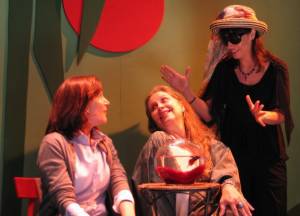
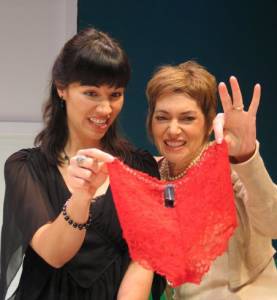
Elizabeth (l.) with Colette Kilroy and Denise Blasor and (r.) with Shawna Casey in The Clean House
Being Guatemalan-American of Chinese-Spanish-Irish-French-German-English-Dutch descent, what kinds of roles do you generally get cast as?
Until recently, on stage I usually got cast in roles that were either not ethnic-specific or were “open casting,” with a few exceptions. This year marks the first time in ages that I was deliberately cast as an Asian, a Latina, and a character of mixed heritage—in three different roles!—something which has been deeply moving for me. In The Clean House, I finally got to play a Latina who grew up outside the USA, who speaks more than one language, who moves to a wealthy town in Connecticut where the other characters think she’s an oddity. Oh, and she hates to clean. These are all things I relate to completely! Now I’m in my second show at East West Players, in which the sisters in Crimes of the Heart are all hapa, in other words partially Asian, and in our cases partially white. It has been so gratifying to be considered “Asian enough” for Mysterious Skin, “Latina enough” for The Clean House, and “hapa-and-for-once-that’s-a-plus” in Crimes of the Heart this year.
Do you see your multi-ethnicity as a plus, a minus, or a non-issue when you go out on auditions?
On TV my roles are usually “open to all ethnicities,” so my competition runs the gamut. At callbacks, there’s often one Asian woman, one African American or black woman, one white man, one older white woman, and me. Clearly, the producers don’t know what they want in these cases. Other times there will be a roomful of vaguely “ethnic”-looking dark-haired olive-skinned women in my age range. Once in a blue moon, everyone will appear to be the same race—except me. On TV, I think my mixed heritage has been a plus for getting smaller roles because I’m filling a quota for people of color, or so I was bluntly told by an agent. It’s been a minus for getting larger roles because those tend to be very ethnic-specific and monoracial.
What about film roles?
On film, I don’t think the directors have cared very much about my ethnicities. Most of my film bookings have been through industry contacts, friends, etc., and they’ve all been independent films.
You’ve also got the advantage of being bilingual. Can you talk about your experience acting in Spanish?
I’ve acted in Spanish in industrials as well as a feature film by the producer of Like Water for Chocolate, and my character in The Clean House spoke Spanish and Portuguese. All of the roles have been interesting, even in the industrials. I’d love to do more work in Spanish, but there are actors out here who are so bilingual that they dream in both languages, and that’s stiff competition.
Does acting in Spanish affect your acting style in any way?
My acting style doesn’t change when I act in Spanish, but I do make sure to sound like an educated Guatemalan, whereas I don’t think about my accent at all when I act in English unless the character has a dialect.
You’ve got quite an impressive list of film and TV credits. Is this why you’ve chosen L.A. as a base rather than another city?
Yes, there’s more work in L.A. and I’ve always loved film. TV and film acting can be very technical—hitting the mark, etc.—but it’s rewarding when you see the final product and you haven’t been cut and your work is good. The pay is better than in the theater.
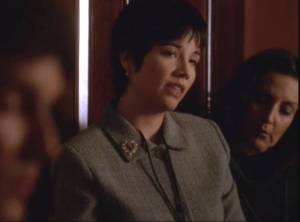
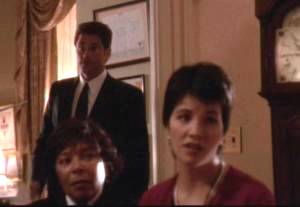
Elizabeth on The West Wing (That’s Rob Lowe in the background on the right)
Is there any particular TV show you’ve guested on that stands out as a favorite, either for the role you played, the people you worked with, or the experience as a whole?
The West Wing, because Martin Sheen and Allison Janney were so kind to me, and the director, Alex Graves, was so supportive, and I got to come back! It also had a lot of clout. While it was airing, whenever some bored, above-it-all person asked me if they might have seen me in something, when I said The West Wing their entire attitude toward me changed for the better. That was quite something.
How does TV and film work compare for you as an actor to performing on the live stage?
I love both screen and stage acting, but of course on stage the actor has the most control. A performance can’t be edited when it’s live. Also, in the theater, the relationship between the actor and audience is so precious. We take that leap of faith together, in real time.
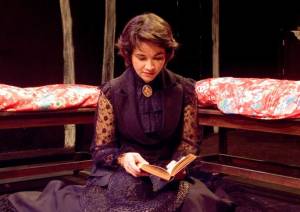
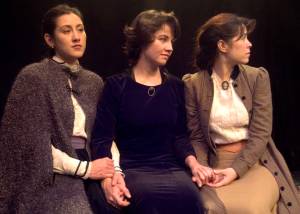
Elizabeth as Masha in The Three Sisters (with Rena Heinrich and Millie Chow)
Still, the fact is that L.A. theater pays much less than film and TV work, yet you keep doing theater between filmed gigs, including numerous roles at Theatre Of NOTE, where you’re a member. Obviously it’s not for the money, so why not stick where the paychecks are?
An actor acts! Most opportunities to act in L.A. are in 99-seat theater, since the competition for well-paid film, TV, and Equity gigs is fierce. I’d rather keep my instrument tuned by rehearsing a play and performing for a live audience, than pay a teacher to do scene study. Don’t get me wrong—training is very important! But I prefer to act for a paying audience who expect me to be good, because the stakes feel higher. Still, having said all that, I admit I’ve reached the point where I want to be paid every time I act, unless it’s a dream role, cast, and production team. I realize it may be wildly difficult to find this, but when even one element is out of whack, and you’re not getting paid to rehearse and you’re barely getting gas money to perform, it can cause so much heartbreak. If it’s not fun or if someone is being unprofessional, why do it indeed? I’ve paid so many dues as an actor. I’m now ready to be pickier for my emotional well-being! I’m so grateful to be working at an Equity house like East West Players. It has been amazing.
Your stage roles seem to be pretty much evenly divided between new plays and the classics. Do you have any preference for one or the other?
I love them all if they’re well written. If a text is set in a former time period outside the USA, as most classics are, I do research on that time and place on top of my usual homework. Otherwise my approach is the same. I usually start out with a sense of adventure and terror.
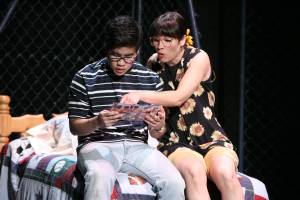
Elizabeth with Scott Keiji Takeda in Mysterious Skin
How was it for you to make your East West Players debut with an all-Asian cast?
Making my East West Players debut was a dream come true. I’d been submitting and auditioning for them for years. The debut has changed the way I view myself in that I feel more confident submitting to Equity houses, as well as for Asian roles now, at least at East West. I don’t look as Asian as I did when I was a kid, so it has been hard to get cast as one. It was very validating to get cast as Avalyn in Mysterious Skin.
Both you and Mysterious Skin got rave reviews in a production that really stretched the boundaries of East West for its subject matter, language, nudity, etc. What kind of audience feedback did you get for your role as Avalyn and for the show as a whole?
The cast got wonderful feedback from the audience after the show and on Facebook, interestingly. It was so lovely. Also, many audience members really liked the show because the subject matter was risky. They liked not being spoon-fed.
Avalyn was quirky to say the least, and so is your character Lenny in Crimes Of The Heart. How would you compare these two roles?
Lenny is very different from Avalyn in that her quirkiness is more grounded, but both characters are funny and sad in their own ways. It’s been wonderful to play these two complex women.
How much of you is there in these two roles?
I think I play roles as radically alternate realities of myself. If this had happened to me, and I were from that state or country, and had this physical condition, etc., then I’d be like Avalyn or Lenny, etc. But I’m not the characters and they’re not me. I’m more of an interpreter.
I’d guess that you, Kimiko Gelman, and Maya Erskine may well be among the first Asian American actresses to play the Magrath sisters in a single production. Why does this kind of casting happen so rarely in this city?
I understand there was a production in Seattle in which all the sisters were Asian. I suspect this might be the first time the sisters have all been hapa, though. I think non-traditional casting happens rarely in L.A. because the majority of actors out here are Caucasian, so it’s not requested as much. It requires the production team and audience to have an imagination and open minds, and some people don’t want to because they don’t have to.
Is there anything that can be done to get it to happen more often?
If we want it to happen more often, we need more actors and directors and producers of color to make it happen, simply because it will occur to us more than it will occur to the average Caucasian theater-maker. The onus shouldn’t solely be on us, but realistically, we’ll probably be the ones to implement the shift if we want to. East West has been a pioneer in that sense! On the positive side, I feel like more new plays in which there are good roles for people of color, or in which the roles are “open ethnicity,” are being written than ever before. I hope we’ll get to a point when both kinds of productions are boringly common: new works with great roles for diverse casts, as well as popular plays and classics that are non-traditionally cast. That would be wonderful.
What is it about Crimes Of The Heart and your role that makes you love your latest gig?
I love the play’s perfect combination of humor and pathos, and how they’re embodied in Lenny.
What do you think audiences are going to love about your character and the show itself?
I think audiences will love Lenny for her strength as well as for her flaws, but especially for her big heart. I think they’ll love the show’s truthful yet humorous depiction of a loving, dysfunctional, Southern, Asian-American, multi-ethnic, quirky family, especially since Asians have been in the American South since the 1600s… I think audiences will enjoy seeing that “take” on this well-loved play.
Are there any roles that you’d particularly love to play, any types of films, plays or TV shows that are on your “I’ve got to do that” list?
Viola in Twelfth Night, Isobel in An Experiment With An Air Pump, a series regular role on any Eick/Moore TV production, roles in films by Lisa Cholodenko and Alfonso Cuarón and Zhang Yimou … The list goes on! I love intelligent, imaginative, and truthful storytelling in any medium. I’d love to act in films being made all over the world.
Thanks so much for taking the time to answer all these questions, Elizabeth. I’m looking forward to another memorable Opening Night at East West Players!
Thank you Steven!
Click here to reserve tickets for Mysterious Skin at East West Players.

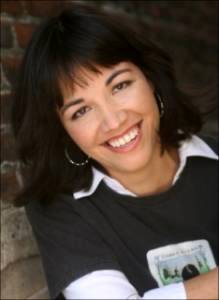
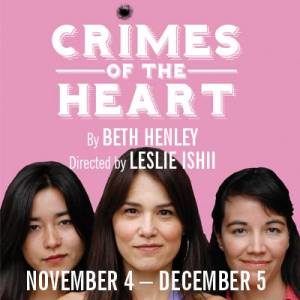

 Since 2007, Steven Stanley's StageSceneLA.com has spotlighted the best in Southern California theater via reviews, interviews, and its annual StageSceneLA Scenies.
Since 2007, Steven Stanley's StageSceneLA.com has spotlighted the best in Southern California theater via reviews, interviews, and its annual StageSceneLA Scenies.







 COPYRIGHT 2025 STEVEN STANLEY :: DESIGN BY
COPYRIGHT 2025 STEVEN STANLEY :: DESIGN BY